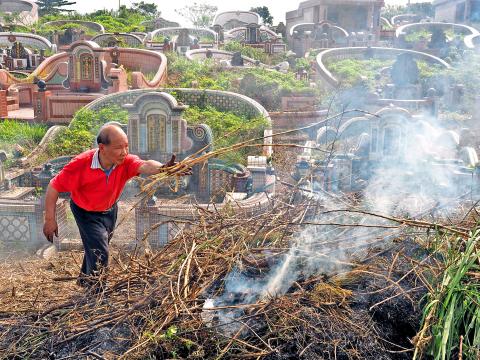More people are seeking eco-friendly burials, with 7 percent of people still using traditional burials, the Ministry of the Interior said yesterday, releasing its latest statistics on funereal preferences to coincide with Tomb Sweeping Day today.
The statistics show that 92.83 percent of people are cremated after they die.
Department of Civil Affairs division head Tang Keng-shen (唐根深) said an elderly woman in Tainan filed a request with the Tainan Danei Tree Burial Special Zone several months before she died to be buried there.

Photo: EPA
He said that the woman had not informed her family members of her decision, and it was not until after she was cremated that an employee at the crematorium told family members that she had registered for a natural burial.
He said her family members were at first surprised at her decision, but later obliged to her desire to “bond with nature.”
Due to limited space, most Taiwanese opt for cremation, and the number of people who say they would prefer to be buried has decreased sharply, Tang said.
Even though more people have embraced environmental burial methods, the number of people choosing natural burial make up just about 1 percent of the number of people cremated, he said.
Since the ministry began promoting eco-friendly burials in 2001, more than 16,000 people have adopted alternative burial methods, such as tree burials or flower burials, he added.
There are 29 natural burial sites at public cemeteries nationwide, including the Yongai Sanctuary and Jhengshan Sanctuary in Taipei; the Sanjhih Cherry Blossoms Sanctuary of Lives in New Taipei City; the Gueisih Sanctuary in Taichung; and the Tainan Danei Tree Burial Zone.
Aside from tree burial, the most popular among natural burial methods, Taipei, New Taipei City and Taoyuan together hold an annual sea burial ceremony, which has served more than 1,000 people since it was introduced in 2001.
Tree and flower burials involve placing ashes into biodegradable urns and burying them among groves at natural sites, Tang said.
Family members of the deceased do not burn ghost money at natural burial sites, instead mourning their loved ones in silence, he said.

ANOTHER EMERGES: The CWA yesterday said this year’s fourth storm of the typhoon season had formed in the South China Sea, but was not expected to affect Taiwan Tropical Storm Gaemi has intensified slightly as it heads toward Taiwan, where it is expected to affect the country in the coming days, the Central Weather Administration (CWA) said yesterday. As of 8am yesterday, the 120km-radius storm was 800km southeast of Oluanpi (鵝鑾鼻), Taiwan’s southernmost tip, moving at 9kph northwest, the agency said. A sea warning for Gaemi could be issued tonight at the earliest, it said, adding that the storm is projected to be closest to Taiwan on Wednesday or Thursday. Gaemi’s potential effect on Taiwan remains unclear, as that would depend on its direction, radius and intensity, forecasters said. Former Weather Forecast

As COVID-19 cases in Japan have been increasing for 10 consecutive weeks, people should get vaccinated before visiting the nation, the Centers for Disease Control (CDC) said. The centers reported 773 hospitalizations and 124 deaths related to COVID-19 in Taiwan last week. CDC Epidemic Intelligence Center Director Guo Hung-wei (郭宏偉) on Tuesday said the number of weekly COVID-19 cases reported in Japan has been increasing since mid-May and surpassed 55,000 cases from July 8 to July 14. The average number of COVID-19 patients at Japan’s healthcare facilities that week was also 1.39 times that of the week before and KP.3 is the dominant

The Chinese Communist Party’s (CCP) working group for Taiwan-related policies is likely to be upgraded to a committee-level body, a report commissioned by the Mainland Affairs Council (MAC) said. As Chinese President Xi Jinping (習近平) is increasingly likely to upgrade the CCP’s Central Leading Group for Taiwan Affairs, Taiwanese authorities should prepare by researching Xi and the CCP, the report said. At the third plenary session of the 20th Central Committee of the CCP, which ended on Thursday last week, the party set a target of 2029 for the completion of some tasks, meaning that Xi is likely preparing to

US-CHINA TRADE DISPUTE: Despite Beijing’s offer of preferential treatment, the lure of China has dimmed as Taiwanese and international investors move out Japan and the US have become the favored destinations for Taiwanese graduates as China’s attraction has waned over the years, the Ministry of Labor said. According to the ministry’s latest income and employment advisory published this month, 3,215 Taiwanese university graduates from the class of 2020 went to Japan, surpassing for the first time the 2,881 graduates who went to China. A total of 2,300 graduates from the class of 2021 went to the US, compared with the 2,262 who went to China, the document showed. The trend continued for the class of 2023, of whom 1,460 went to Japan, 1,334 went to